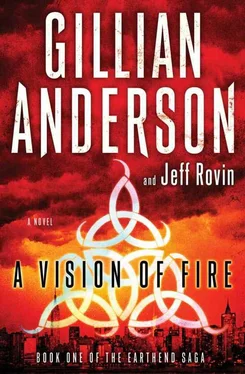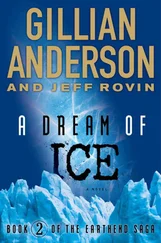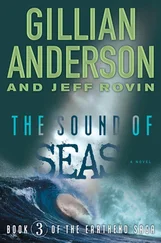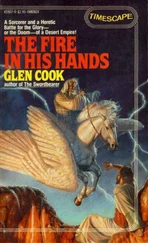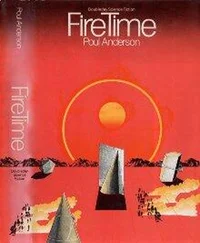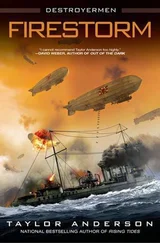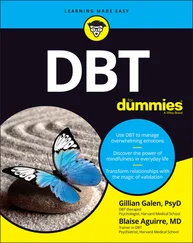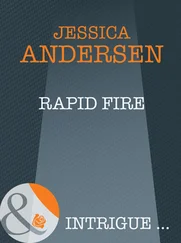“ Ulzii ,” he whispered.
The library rules became a haze of meaningless sounds in his head.
“ Ulzii? ” he repeated.
He pushed the chair back, scraping it along the floor. There was someplace he had to be, but ulzii was not a place. It was…
He reached into his backpack under the table. Feeling his way through the lentils and onions, he found the sunflower oil. He grasped the small plastic bottle and held it tight to his chest with his left hand.
Ulzii. He somehow knew he needed oil . Now he had to go as fast as he could.
The young man rose unsteadily, the legs of the wooden chair dragging again on the floor. He drew annoyed glances from half a dozen students at different tables. Atash was oblivious to their presence. He was walking now, bumping into the edge of the next table, pressing past it, bumping into another, slipping through a door.
“You cannot go there!” a student hissed as the door eased shut behind him.
Atash heard his words but they did not make sense. He saw glimpses of dark stone through a haze of red and black. He saw sheer fabric, white and yellow, spinning hypnotically as if caught up in a cyclone. This was where he had to be.
Ignoring pinpricks of pain on his cheeks and hands, the young man reached into his shirt pocket and pulled out cigarettes. He dropped the package to the floor and fished again blindly, pulling out a lighter. He flicked it open, uncapped the bottle of oil, released it spewing at his feet. He ignited the lighter and let it fall from his fingers. The flames crawled and then leaped up his pant legs.
He bellowed from deep in his throat.
Niusha Behnam, the librarian, jerked open the door and ran toward an orange shadow that could be seen among the stacks. Several students ran in after her as the smell of smoke reached the main room. They crowded the narrow alleys of books, pushing and shouting but also just staring. The students in the rear were forced back as Niusha called for the fire extinguisher. Someone yanked it from the wall and the crowd passed it toward her like an old-fashioned bucket brigade, and she turned the spray toward the fiery column. The flames had reached the paper-filled shelves and it took some strength and great sweeping movements to soak the rapidly expanding inferno. But at the heart of it, at the center of its blazing anonymity, was Atash, a boy, on fire and screaming.
Caitlin woke to the sound of Jacob drumming on the wall that separated their bedrooms.
It had started a year earlier and it happened on average once a week. She’d naturally considered a number of psychological explanations, from recurring dreams to unexpressed emotions, but he was usually asleep when she went to him, tapping hard with his fingertips, like he was hitting a bongo. It ceased when she woke him, and he had no memory of having done it. After several weeks Caitlin tried a different tack: she rapped back, hard enough for him to feel the vibrations. He immediately stopped and fell back to sleep. She realized then that this was his way of connecting with her when he felt alone. It was a common feeling among children, who, after all, were vulnerable on every conceivable level, hence the very crux of her practice. The world had little patience or concern for innocence.
Though Jacob slumbered on, Caitlin did not. Her restlessness poisoned her sleep. She couldn’t recall the nightmares but was left with the familiar feeling of hot, ashy, gritty mud. She reached for her cell phone and saw a text: So either the date was so amazing u disappeared with him for 2 days or it was a dud and ur avoiding talking about it.
Caitlin had forgotten to text Abby back. She quickly typed: Dud. And life is crazy right now, promise I’ll call soon.
OK love u
Love u 2
Gradually Caitlin calmed and drifted off.
The alarm on her cell phone snapped her awake.
“Crap.”
That was the Beep of Death, the last warning. She had slept through sunrise, through Jacob using the bathroom, and through the first “ocean wave” alarm on her clock.
Dressing while hurrying into the living room, Caitlin caught Jacob waggling his arms at his fish like a giant squid instead of putting on his shoes. He didn’t acknowledge her arrival.
Well, a squid wouldn’t , she thought. Jacob’s imagination was nothing if not immersive and absolute.
When they eventually left their building he ran ahead of her to the subway and forgot to hug her good-bye when they reached his school on East Twenty-Third. Maybe that’s impending tweenitude too , Caitlin thought. Left alone, she realized that she had felt sad all morning. But it would pass, she told herself in the same tone she might a patient.
And as a matter of immediate fact she had a breakfast appointment with Ben. She speed-walked the eleven blocks to the rendezvous. Since this was taking up her gym time, that would have to pass as her exercise for the day.
She was first to arrive at the French bistro in Murray Hill, a ten-minute walk from the United Nations. The warmth of the restaurant steamed the corners of the street-side windows and made Caitlin feel like she was walking into a protective bubble. She hung her coat on the booth-side rack, sat with a thump on the well-worn seat, and ordered coffee for two.
Then she could not resist checking her e-mail again. She found that an addendum to the adolescent schizophrenia newsletter had been e-mailed to the list—an item odd enough, and tragic enough, not to wait for the next scheduled newsletter. A college student in Iran, Atash Gulshan, had set himself on fire in a library and was now hospitalized. The act did not appear to be politically or religiously motivated, although two days before, his older brother had been hanged by the government for an unspecified crime. Little other information was available, but one sentence jumped out at her: “Witnesses reported that Gulshan exhibited logorrhea shortly before attempting suicide.”
“Logorrhea”—saying nonsense words. Maanik’s father mentioned that Maanik had spoken gibberish at one point. Caitlin made a mental note of it.
Then Ben arrived, with a huge smile, and Caitlin’s tense concentration happily dissolved.
“Thanks for that smile,” she said.
“You’re welcome,” he replied, lifting her small coffeepot. “Coffee in your lap?”
“Please.” She laughed at their old joke. Though they had become firm friends nine years ago when Ben taught Caitlin how to sign, their first meeting had occurred years before, when they were both English majors at NYU. Ben had accidentally spilled a cup of coffee on her in a crowded diner and, after purchasing a replacement, spilled that on her too.
“How was your night?” he asked as he poured himself a cup.
“I live with a ten-year-old,” she said. “When I’m with him, I’m fine. We live in a wonderful little biosphere.”
Ben turned suddenly somber. “How do you do it, Caitlin?”
“What?”
“Maanik,” he whispered to protect her anonymity. “She isn’t my kid and yet I’ve been so worried about her I couldn’t sleep. How do you have a child without being terrified all the time?”
“Well, that’s the big secret to parenting, Ben.” Caitlin whispered. “You are terrified all the time. You get used to it. It becomes part of the background. Except for the times when it stabs you through the heart.”
He gazed at her a moment, then looked down at his menu.
“That was probably the worst sales pitch ever for having kids,” he said.
Caitlin laughed. “You were never really tempted anyway.”
“I’m tempted all the time,” Ben said to his menu.
Читать дальше
